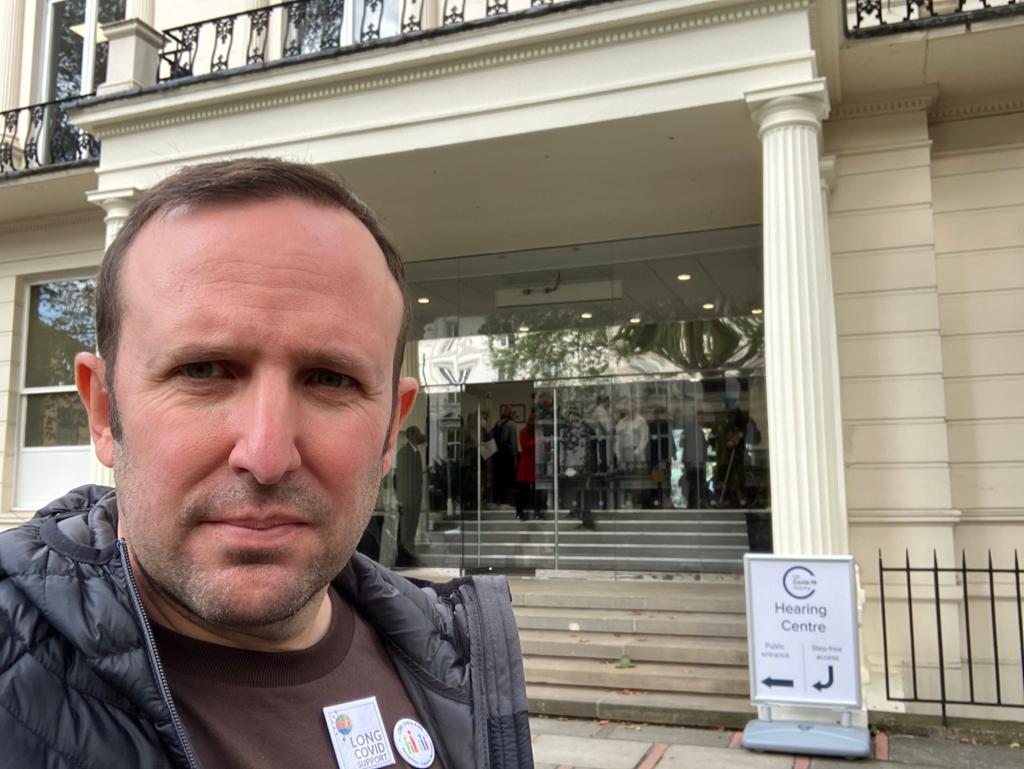Gareth Evans, a 46-year-old man from Cwmbran, fell ill with Covid-19 during the first wave of the pandemic in April 2020. He is one of an estimated 1.9 million people in the UK alone still suffering with the ongoing effects of Long Covid for which there is still little in the way of testing or treatment. Now a member of the charity, Long Covid Support, he attended the Covid-19 Inquiry in London last Friday examining the UK Government’s response to the Covid outbreak. Here is Gareth’s account of what happened.
“It’s 9am on Friday the 13th October 2023. A disparate group of people from all corners of the UK converge on the steps of a former stately hotel in the affluent suburb of Paddington, London. They’ve never met before. Not in person at least. Word gets around that some have travelled from the North of England. A teenage girl had flown in from Northern Ireland with the help of a wheelchair while escorted by her parents. I myself had travelled up from Cwmbran the previous evening. Others would have wanted to come as well but they just weren’t physically able. Instead, they were left to watch the online livestream from the comfort of their beds.
“We’re here to attend the Covid-19 Inquiry. The latest module of the inquiry intends to learn the lessons of the UK government’s response to the Covid-19 outbreak. Was the government prepared to deal with a novel coronavirus spreading like wildfire that impacted millions around the country and beyond? Were they effective in containing its spread minimising the devastating impact it would have, and continues to have, on many of us?

“Until now, the focus of the Inquiry has rightly been on those who paid the ultimate price during the pandemic leaving behind their grieving families and friends. While the public’s attention was drawn to the resulting deaths and hospitalisations, today was the turn of those that many amongst our numbers would regard as being the forgotten victims of the Covid-19 pandemic. The irony of the hearing date wasn’t lost on us – we had the misfortune to catch the virus and months, even years later, we simply haven’t recovered. We have Long Covid.
“The morning session consisted of Alex Thomas, an expert in government policy making, providing his take on the chaos that resided in the corridors of power during the unfolding pandemic. At several points, the legal team would flash up evidence on the big screen – letters, emails and private Whatsapp messages between civil servants and ministers revealing their own express views about each other’s shortcomings. At one point, written guidance had been provided to Boris Johnson by the Department of Health and Social Care outlining the long term effects of Covid-19. To which Boris had scrawled ‘B*****ks’ across it, comparing it to ‘Gulf War Syndrome stuff’.

“An audible gasp could be heard within the room. When the expert was asked what he thought of the government’s response, a lady in front of me, visibly shaken, interrupted. ‘It’s a disgrace’, she said. Many within the Long Covid community feel it was this type of attitude shown by the country’s leaders that would set the tone of the incredulity and gaslighting that many Long Covid suffers have experienced during their illness.
“Later, two experts on Long Covid, Professor Chris Brightling and Dr Rachael Evans based at Leicester University would provide an insight into Post Covid-19 syndromes and the emergence of Long Covid – a poorly understood multisystem illness resulting in a host of ongoing and debilitating symptoms including fatigue, brain fog, insomnia amongst many others.
“At the lunch break, I spoke with the lady who had spoken out. Her name was Cheryl. She’s a full time carer to her husband who remains bedbound with Long Covid and left unable to work. She expressed her frustration at having to complete a Personal Independence Payment (PIP) application. Due to her husband’s cognitive difficulties, he’s unable to fill out the lengthy forms himself. With the lack of a diagnostic test, any meaningful treatment, they, like many other Long Covid sufferers, face an uphill struggle to prove they even have a disability to get the financial support they need. By some co-incidence, Cheryl was also from Leicester. Later, I would see her outside the hearing room having collared the two experts from her home town pleading for the help that her local GP has been unable to provide due to the limited knowledge around the illness.
“The final afternoon session was an opportunity for Ondine Sherwood to speak on behalf of all of the Long Covid patient groups set up since the beginning of the pandemic. Herself a co-founder of the campaigning and advocacy group, Long Covid SOS, she explained how sufferers found each other on social media and banded together to provide each other with support, offer advice and share medical research. They provide a beacon of hope to all Long Covid sufferers by drawing attention to the illness. The inquiry is due to conclude in Summer 2026. It remains to be seen what the outcome will be but, for now, for Cheryl and the untold numbers affected by Long Covid, our search for answers goes on.”
Note: I’ve been friends with Gareth Evans since we met in infants school. When I saw he had attended the inquiry I asked him if wanted to share his experience on the community voices section of Cwmbran Life.




